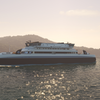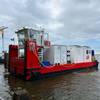Key risks to bulk carriers are identified as side shell failure and hatch cover failure
Extensive work on bulk carrier safety coordinated by the Maritime and Coastguard Agency (MCA) with international participation is now complete, and a final report of the study results has been submitted to the Maritime Safety Committee of the International Maritime Organization (IMO) for consideration at their meeting on December 2nd to December 13th 2002.
The United Kingdom has been fully committed to addressing bulk carrier safety following the loss of the MV Derbyshire in 1980 with the loss of 44 lives. Bulk carrier safety has a poor record with over 500 ship casualties resulting in the loss of more than 2000 lives in the period from 1978 to the present date.
The formal investigation into the tragedy prompted the UK to instigate an International Collaborative FSA study into bulk carriers. The MCA has since acted as co-ordinator and project manager of the International Collaborative Formal Safety Assessment (FSA) of Bulk Carriers Project. Proposals were drafted and received the support of the IMO to undertake a holistic study to assess bulk carrier safety.
An extensive hazard identification exercise was undertaken and casualty data from Lloyds Register of Shipping was used in the subsequent risk assessment. It was identified that the key risks to bulk carriers are side shell failure and hatch cover failure, which both contribute heavily to the loss of life. A total of 78 risk control options (RCOs) were identified using fault and event tree techniques and each was evaluated in the cost benefit assessment.
The net cost of averting a fatality for each risk control option was calculated based on the cost of implementation, the economic benefit to the stakeholders and the potential numbers of lives saved. Cost-effective risk control options were provisionally selected on the basis of either a net cost of averting a fatality of less than 1 million US dollars, or of providing a reduction in the potential loss of life of more than 0.001 lives per ship year. These compare favourably with other transport modes.
The study was structured as a series of work packages, undertaken by a range of European organisations and was overseen by an International Project Steering Board represented by 14 countries and 18 non-Government organisations. The study was jointly funded by the UK Department for Transport and the European Commission, and with contributions in kind from participating organisations.
Subscribe for
Maritime Reporter E-News
Maritime Reporter E-News is the maritime industry's largest circulation and most authoritative ENews Service, delivered to your Email five times per week










